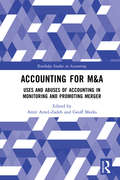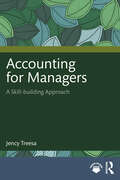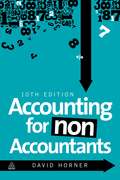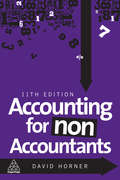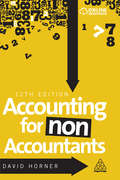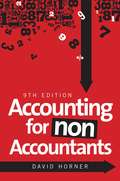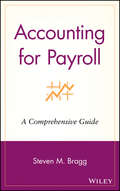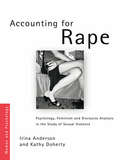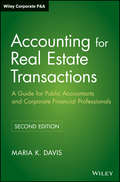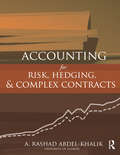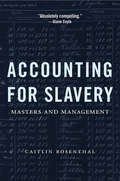- Table View
- List View
Accounting for M&A: Uses and Abuses of Accounting in Monitoring and Promoting Merger (Routledge Studies in Accounting)
by Amir Amel-Zadeh Geoff MeeksSpending on M&A has, in aggregate, grown so fast that it has even overtaken capital expenditure on increasing and maintaining physical assets. Yet McKinsey, the leading management consultancy, reports that "Anyone who has researched merger success rates knows that roughly 70% fail". The idea that businesses might be using huge and increasing sums of shareholders’ money for an activity which more often than not leads to failure calls into question the information on which M&A decisions are based. This book presents statistical studies, case material, and standard-setters' opinions on company accounting before, during and after M&A. It documents the manipulation of annual accounts by acquirers ahead of share for share bids, biased forecasts of post-merger earnings by bidders, and devices to flatter earnings when recording the deal. It explores the challenges for standard-setters in regulating information flows during and after M&A; and for account-users wishing to learn from financial statements how a deal has affected performance. Drawing on a wide range of international examples, this readable book is targeted not just at accounting specialists, but at anyone who is comfortable reading the serious financial press, is intrigued by what is going on in the massive M&A market, and concerned to achieve better informed M&A. As such it might be of particular interest to business executives, lawyers, bankers and investors involved in M&A as well as graduate students interested in researching or learning about the role of accounting in M&A.
Accounting for Managers: A Skill-building Approach
by Jency TreesaThis book presents fundamental aspects of financial accounting, its basic terminology, the accounting process and the preparation of a journal, ledger, trial balance, income statement and balance sheet. It also introduces complex topics like tools of management accounting, sustainability reporting and financial reporting. The volume comprehensively delivers lessons and examples to build strong accounting skills guiding readers to learn how to read and analyse financial statements, and discusses the theoretical concepts followed by elaborating on the accounting process in a simple and lucid style. Numerical examples and case studies support every discussion involving a conceptual difficulty. Several charts and diagrams have been included to shed light on the finer points of the subject to make it easily comprehensible.This book would be useful to students, researchers and teachers of financial accounting, accounting, statistics and business management. The book would also be useful for anyone interested in learning the basic concepts of financial accounting to help them in their daily lives.
Accounting for Manufacturing Companies
by Srikant M. DatarThe accounting for a manufacturing company is examined, including the flow of costs from raw materials to work in process to finished goods and the distribution between an inventoriable or product cost and a noninventoriable or period cost.
Accounting for Marketable Securities and the "Recycling" of Income
by Gregory S. MillerGives an overview of accounting for equity investments less than 20%. Uses this accounting to introduce the issue of amounts included in the statement of comprehensive income during a different time period from its inclusion in net income (sometimes called "recycled earnings").
Accounting for Ministers
by Samuel BerlinskiAccounting for Ministers uses the tools of modern political science to analyse the factors which determine the fortunes of Cabinet ministers. Utilising agency theory, it describes Cabinet government as a system of incentives for prime ministerial and parliamentary rule. The authors use a unique dataset of ministers from 1945 to 2007 to examine the structural and individual characteristics that lead to the selection and durability of ministers. Sensitive to historical context, it describes the unique features of different Prime Ministers and the sorts of issues and scandals that lead to the forced exit of ministers. The authors identify the structural factors that determine ministerial performance and tenure, seeing resignation calls as performance indicators. Probing the nature of individual and collective responsibility within Westminster forms of government, its rigorous analysis provides powerful new insights into the nature of Cabinet government.
Accounting For Non-accountants
by David HornerNow in its 10th edition, Accounting for Non-Accountants provides the perfect introduction to the basics of accounting and finance. Designed for non-specialists with little or no background in accounting, it guides readers through the maze of financial terms and accounting concepts and techniques in a clear and easy-to-follow style. Updated for 2015, Accounting for Non-Accountants includes information on the new UK GAAP accounting standards as well as an overview of current international standards, and is structured to provide in-depth understanding in three key areas: annual accounts (including income statements, balance sheets, cash flow and reporting standards); management accounting (costing, marginal costing and budgetary controls); and financial management (including the cost of capital, working capital, investment appraisal and performance analysis).
Accounting for Non-Accountants
by David HornerAccounting for Non-Accountants provides the perfect introduction to the basics of accounting and finance. Designed for non-specialists with little or no background in accounting, it guides readers through the maze of financial terms and accounting concepts and techniques in a clear and easy-to-follow style.Now in its 11th edition, Accounting for Non-Accountants includes information on the UK GAAP accounting standards as well as an overview of current international standards, and updates including a new chapter on how competition, the financial markets and government economic policy can influence organizations. The book is structured clearly to provide in-depth understanding in three key areas: annual accounts (including income statements, balance sheets, cash flow and reporting standards); management accounting (costing, marginal costing and budgetary controls); and financial management (including the cost of capital, working capital, investment appraisal and performance analysis).With updated online resources including additional review questions for each chapter and a multiple choice question section, Accounting for Non-Accountants is ideal for beginners and provides an excellent grounding for those taking accountancy qualifications.
Accounting for Non-Accountants: A Manual For Managers And Students
by David HornerAccounting has a reputation as a technical and jargon-heavy subject, but there is no reason why those without formal training cannot master the basics of interpreting accounts and making good decisions. Accounting for Non-Accountants assumes no prior knowledge of the subject area and is designed to serve as an introductory text for managers and non-specialists who wish to gain an oversight of the accounting discipline. The book covers both financial and management accounting in sufficient detail to allow data to be interpreted but in a clear and accessible manner so the reader can quickly gain an understanding of the basic principles of the subject area. Now in its 12th edition, Accounting for Non-Accountants has been fully updated to the latest regulatory requirements including the UK GAAP framework, International Financial Reporting Standards (IFRS) and International Accounting Standards (IAS). The final chapter focuses on the impact of changes in the economic environment on businesses and there are introductions to areas including tax, transfer pricing and creative accounting. This practical guide includes review questions in each chapter, with answers and workings where appropriate, and is supported online by over 200 questions and a glossary to develop a firm understanding of all topics.
Accounting for Non-Accountants
by David HornerDesigned for students and managers who are approaching the subject from a non-finance background, Accounting for Non-Accountants guides readers through the maze of financial terms, theories and techniques surrounding business finance and accounting, doing so in a logical, meaningful and easy-to-follow style. Completely rewritten and updated for 2013, it includes information on the latest accounting standards and taxation issues, and is structured to provide in-depth understanding in three key areas: annual accounts (including profit and loss accounts, balance sheets, cash flow and reporting standards); management accounting (costing, cost-based pricing, marginal costing and budgetary controls); and financial management (including the cost of capital, working capital, takeovers, buy-outs, taxation and international transactions). <P> Widely used as an introductory text for business and management students on a variety of courses, Accounting for Non-Accountants remains essential reading for anyone looking to gain a solid understanding of accounting principles and practice.<P> Advisory: Bookshare has learned that this book offers only partial accessibility. We have kept it in the collection because it is useful for some of our members. To explore further access options with us, please contact us through the Book Quality link on the right sidebar. Benetech is actively working on projects to improve accessibility issues such as these.
Accounting for Non-Accountants: The Fast and Easy Way to Learn the Basics
by Wayne A. LabelAimed at entrepreneurs and anyone else who wants to make informed financial decisions, this accessible text introduces the fundamentals of accounting and bookkeeping. Label (a CPA and educator) uses a fictitious small business case to illustrate the use of such tools as financial statements and balance sheets. He also describes how budgets are created and discusses the various types of audit reports. <P> <i>Advisory: Bookshare has learned that this book offers only partial accessibility. We have kept it in the collection because it is useful for some of our members. To explore further access options with us, please contact us through the Book Quality link on the right sidebar. Benetech is actively working on projects to improve accessibility issues such as these. </i>
Accounting for Nuclear Power Provisions at RWE
by Paul M. Healy Jonas HeeseAccounting for Nuclear Power Provisions at RWE
Accounting for Payroll
by Steven M. BraggA one-stop resource for setting up or improving an existing payroll system The most comprehensive resource available on the subject, Accounting for Payroll: A Comprehensive Guide provides up-to-date information to enable users to handle payroll accounting in the most cost-effective manner. From creating a system from scratch to setting up a payroll department to record-keeping and journal entries, Accounting for Payroll provides the most authoritative information on the entire payroll process. Ideal for anyone new to the payroll system or as a skill-honing tool for those already immersed in the field, this hands-on reference provides step-by-step instructions for setting up a well-organized payroll system or improving an existing one.
Accounting for Pensions and Employee Benefits at Ford and Toyota
by Douglas J. Skinner Laura E. Donohue Gregory S. MillerUses Ford's and Toyota's financial statements to familiarize students with the information provided in pension footnotes. Allows students to combine that information with other financial statement information to create a greater understanding of the costs of each company's business. Includes directive questions.
Accounting for Political Risk at AES
by Suraj Srinivasan Gerardo Perez CavazosAs a global energy generating company, AES frequently faces challenges from political changes and instability. This is exacerbated by the fact that in many instances AES' primary customer is the government, which is also in charge of law-making. For example, AES' management team has encountered expropriation risks in Venezuela, collection problems in the Dominican Republic, and regulatory changes in the United States that have led to asset impairments. More recently, the Bulgarian energy regulator announced its intentions to seek a 30% price reduction on a power purchase agreement signed over ten years ago with AES. Accordingly, AES' management is evaluating whether the renegotiation will lead to any asset impairments and the overall effects on its financial statements.
Accounting for Political Risk at AES (B)
by Suraj Srinivasan Gerardo Perez CavazosAccounting for Political Risk at AES (B) by Gerardo Pérez Cavazos and Suraj Srinivasan Supplement to the (A) case, HBS No. 118-023
Accounting for Productivity Growth
by Forest ReinhardtIntroduces students to the arithmetic of the accounting for national productivity growth. It defines labor productivity, capital productivity, and total factor productivity, describes the relationships among them, and discusses the phenomena that cause them to change over time. Exhibits include data for the United States and other industrial countries, which both show the relationships among the various measures and allow comparison across time and space. The end of the note discusses the 1992 controversy over productivity growth in Singapore. Productivity is an important phenomenon, widely discussed in the newspapers, but rarely even defined. Business students, especially those engaged in country analysis, need to understand the various ways in which it is measured and why those various quantities have changed over time in different nations. Intended for an introductory MBA course.
Accounting for Property, Plant, Equipment and Other Assets
by William J. Bruns Jr.An introduction to depreciation accounting and depreciation methods for capital assets. Also covers gains or losses on asset disposal and accounting for other investments and intangibles.
Accounting for Rape: Psychology, Feminism and Discourse Analysis in the Study of Sexual Violence (Women and Psychology)
by Irina Anderson Kathy DohertyAccounting for Rape presents an original perspective on the subject of rape, focusing on both female and male sexual violence. The authors investigate everyday beliefs about rape, to examine how blaming the victim and the normalization of rape are achieved by people in a discussion about sexual violence. They synthesize discursive psychology and a feminist standpoint to explore precisely how rape and rape victimhood are defined in ways that reflect the social, political and cultural conditions of society. By analysing conversational data, Anderson and Doherty suggest that the existing social psychological experimental research into rape and rape perception fails to analyse the subtlety and political significance of rape supportive reasoning. Accounting for Rape provides a critical interrogation of the dominant theories and methodologies, focusing on: How the gender and sexual orientation of alleged victims and perpetrators is crucial to social participants when making sense of a rape report and in apportioning blame and sympathy How arguments that are critical of alleged victims are built in ways that are 'face saving' for the participants in the conversations, and how victim-blaming arguments are presented as 'common sense'. The potential of applying this approach in both professional and academic contexts to promote attitude change. The book will be of great interest to those studying social and clinical psychology, cultural studies, sociology, women's studies and communication studies.
Accounting for Real Estate Transactions
by Maria K. DavisAccounting for Real Estate Transactions, Second Edition is an up-to-date, comprehensive reference guide, specifically written to help professionals understand and apply the accounting rules relating to real estate transactions. This book provides financial professionals with a powerful tool to evaluate the accounting consequences of specific deals, enabling them to structure transactions with the accounting consequences in mind, and to account for them in accordance with US GAAP. Accountants and auditors are provided with major concepts, clear and concise explanations of real estate accounting rules, detailed applications of US GAAP, flowcharts, and exhaustive cross-references of the authoritative literature.
Accounting for Risk, Hedging and Complex Contracts
by A. Rashad Abdel-KhalikWith the exponential growth in financial derivatives, accounting standards setters have had to keep pace and devise new ways of accounting for transactions involving these instruments, especially hedging activities. Accounting for Risk, Hedging and Complex Contracts addresses the essential elements of these developments, exploring accounting as related to today's most relevant topics - risk, hedging, insurance, reinsurance, and more. The book begins by providing a basic foundation by discussing the concepts of risk, risk types and measurement, and risk management. It then introduces readers to the nature and valuation of free standing options, swaps, forward and futures as well as of embedded derivatives. Discussion and illustrations of the cash flow hedge and fair value hedge accounting treatments are offered in both single currency and multiple currency environments, including hedging net investment in foreign operations. The final chapter is devoted to the disclosure of financial instruments and hedging activities. The combination of these topics makes the book a must-have resource and reference in the field. With discussions of the basic tools and instruments, examinations of the related accounting, and case studies to help students apply their knowledge, this book is an essential, self-contained source for upper-level undergraduate and masters accounting students looking develop an understanding of accounting for today’s financial realities.
Accounting for Slavery: Masters and Management
by Caitlin RosenthalCaitlin Rosenthal explores quantitative management practices on West Indian and Southern plantations, showing how planter-capitalists built sophisticated organizations and used complex accounting tools. By demonstrating that business innovation can be a byproduct of bondage Rosenthal further erodes the false boundary between capitalism and slavery.
Accounting for Slavery: Masters and Management
by Caitlin RosenthalCaitlin Rosenthal explores quantitative management practices on West Indian and Southern plantations, showing how planter-capitalists built sophisticated organizations and used complex accounting tools. By demonstrating that business innovation can be a byproduct of bondage Rosenthal further erodes the false boundary between capitalism and slavery.
